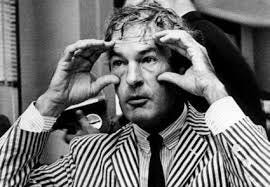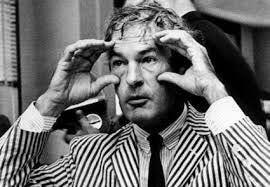Timothy Leary was a Creep
What Benjamin Breen's research from Tripping on Utopia reveals about the so-called psychedelic pioneer
Look, I was never enamored by Timothy Leary or his story, but I’m fascinated by people who are. And, seriously, bros won’t stop mentioning Leary when I reveal my history with psychedelics. (Whyyyy?) Long story short, as I read Tripping on Utopia, I was continually struck by Benjamin Breen’s critique of Leary and the way the alleged psychologist’s ideas and behaviors are being repeated today by people like Rick Doblin, Elon Musk and bros from out of town who try to buy mushrooms from me at the bar as soon as I tell them about this blog.
Look, plenty of evidence shows Timothy Leary was a creep. He’s not someone to be emulated. And many psychedelic advocates are making the same mistakes today that Leary made several decades ago.
Timothy Leary embodied a “tension between his idealism and his disregard for others,” Breen writes. “Making bold scientific claims came easily to him. Honestly facing up to the risks involved in psychedelic research did not. As a therapist with over a decade of experience, Leary knew enough to realize…the need for well-defined safeguards when it came to psychedelic experimentation. Leary swung between describing psychedelics in clinical and messianic terms, but he always seems to have remained secure in his belief that there was little need for self-reflection or for caution. Armed with this beguiling but toxic combination of traits, Timothy Leary would spark a mass movement—but also trigger a massive backlash.”
Here are some facts about Leary’s thinking and his life that often get left out of the record, recovered by Breen in Tripping on Utopia:
Leary’s first wife Marianne committed suicide after she told him, the night before her death, that an affair he was engaged in made her “incredibly unhappy.” He replied, “That’s your problem.”
“Leary and his circle were blatantly misogynistic even by the standards of the time, and at least one member of his research team, a therapist, later faced credible charges for sexual assault from former patients,” Breen writes.
Leary claimed in a speech that “LSD is a specific cure for homosexuality” and then he cited Allen Ginsberg as an example of someone who had been healed by it. Ginsberg was deeply offended and never spoke to him again.
One of my favorite moments in Tripping on Utopia occurs when Jean Houston, the lone female anthropologist in Leary’s circle, delivers this beat down: “She recalled telling the group that ‘male scholars taking drugs and sitting in lotus position’ was unlikely to lead toward the widespread adoption of psychedelics as transformative tools.” WORD. Rick Doblin why won’t you listen?
Leary was unbelievably arrogant, as evidenced by many quotes from his speeches and papers Breen includes in Tripping on Utopia. For example Leary wrote of himself, “Since my illumination in August, 1960, I have devoted most of my energies to try to understand the revelatory potential of the human nervous system and to make these insights available to others.” Other scientists at the time began arguing psychedelics researchers shouldn’t use the compounds themselves lest them become “enamored of the mystical hallucinatory state” like Leary had.
Leary rebranded himself again and again during his career, but all of his attempts were egotistical an antithetical to psychedelic science. After his wife’s suicide, he called himself an “existential psychiatrist.” At Harvard in the 1960s, he saw himself as a lonely prophet surrounded by enemies. By the end he talked about himself as “a religious leader who prescribed psychedelics to his followers as a religious sacrament.” Breen writes, “In their tendency to portray their work as a radical break from the past, the group that developed around Leary differed sharply from other psychedelic researchers of that period who believed they were contributing to an ancient body of knowledge.”
Leary and Richard Alpert, who later became known as Ram Dass, had a falling out after Alpert sold his motorcycle to fund Leary’s idea to create a psychedelic paradise on a beach in Mexico. Leary wanted to call the place Hotel Nirvana. But Alpert later found out Leary spent the money from his bike on a boat.
Leary sucked at hosting trips and people he invited to do drugs with him got creeped out by him. Here’s what William Burroughs, a famous beat poet, wrote after hanging out with a drunken Leary in Mexico : “Situation here worse than I can tell you. DO NOT TAKE ANY HALLUCINOGEN UNDER ANY CIRCUMSTANCES." A young researcher who tripped with Leary said the psychologist appeared as a vampire and refused to use drugs with him ever again. One of Leary’s friends wrote that he had a phony persona and, “One of Tim’s attributes was his strong desire to get his name in the paper.”
Leary’s utopian plan amounted to these few sentences: “First we would initiate and train influential Americans in consciousness expansion. They would help us generate a wave of public opinion to support massive research programs, licensing procedures, training centers in the intelligent use of drugs.” This was almost word for word the stated goal of The Shaman and the people around him. It doesn’t sound all that different from MAP’s mission statement either.
Creepy.





I’m also fascinated by who people are. Thank you, Natalie, for inspiring me to read Tripping on Utopia. What little I know of Leary doesn’t give off positive vibes. I just saw a documentary (or read an article - can’t remember which) where he was featured. Leary comes across as a total cold and unfeeling narcissist. I wonder how that influenced carried over into the MAPS organization with Rick Doblin at the helm. There seems to be a blatant disregard not only for the letter of law, but the idea that somehow you’re above the law because of your sheer superior status as an anointed one. Reminds of a well known American political candidate. Also I thought it was interesting that Timothy Leary and Charles Manson were placed next to each other in jail cells. I’m sure each of them took copious notes of their exchanges and mutual insights as to blight of the human condition. If only everyone would follow their lead, the world would be such a better place.
That entire world seems custom-built for narcissists and charlatans, going all the way back. I'm glad you got the hell out of it, and have the steel to write about it with the filters off...